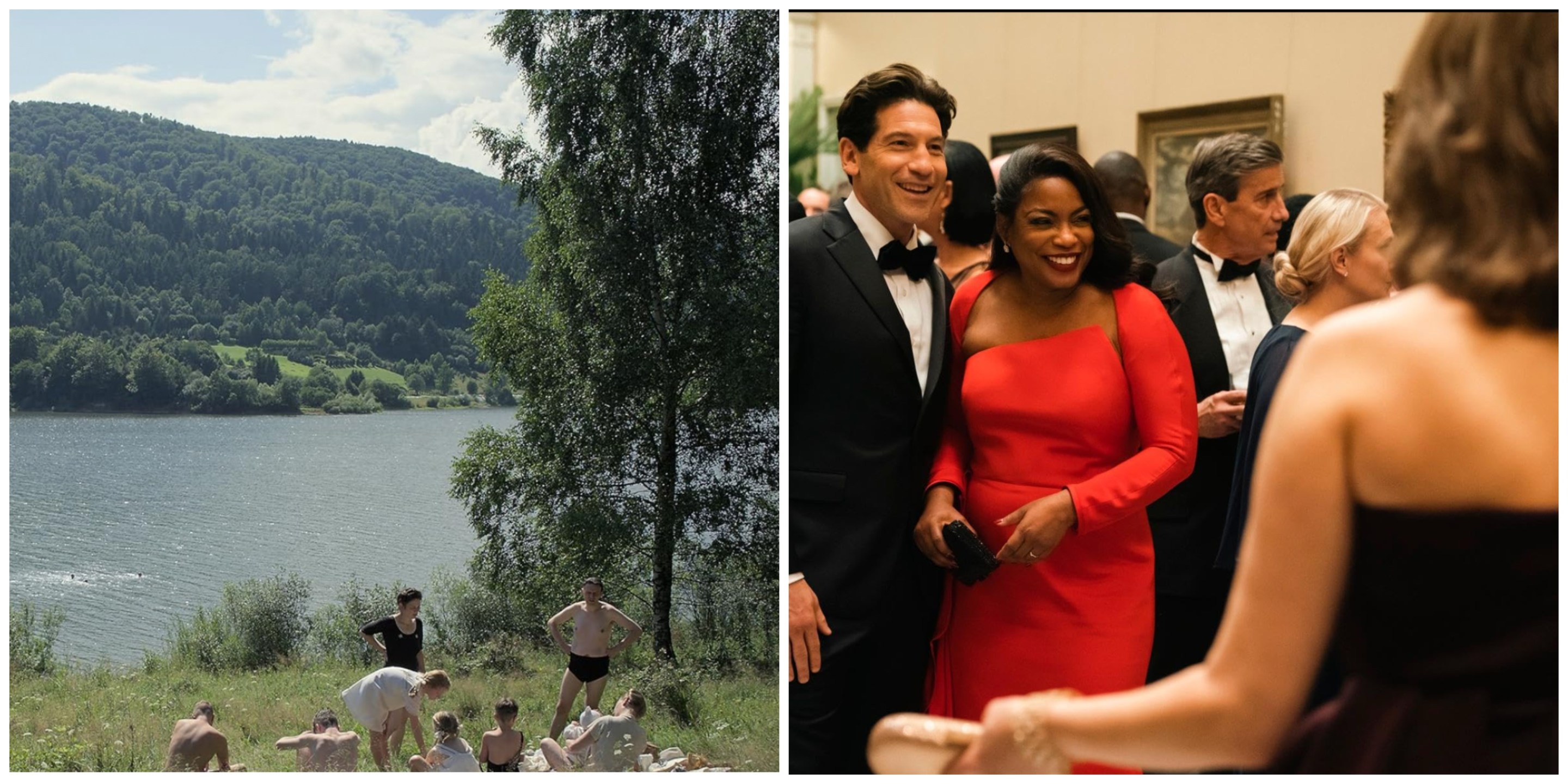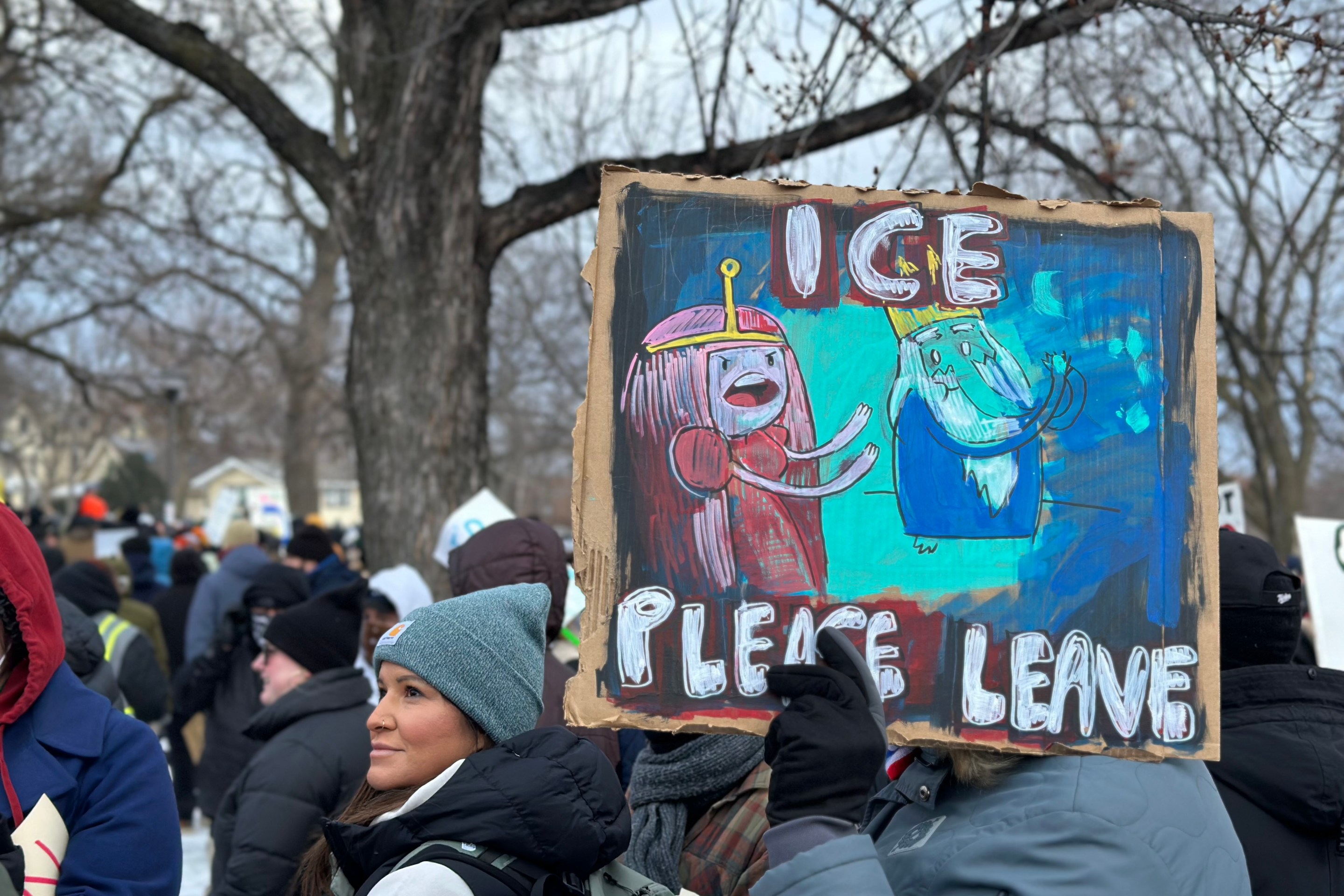Look, it’s not like I want to be the asshole who’s unmoved and even slightly irritated by two big prestige films about Important Topics that have recently arrived in a theater near you. But here we are. Unlike lots of such movies, Jonathan Glazer’s The Zone of Interest and Ava DuVernay’s Origin don’t breathlessly pander in their lust for big golden statuettes (though the former is up for a few and DuVernay definitely feels miffed that the latter isn’t). For what it’s worth, each fails in good faith. But both are torn between being films and arguments, and both bank on the fact that our prior emotional responses to actual historical atrocities will make us overlook the flaws in their thesis statements
The Zone of Interest seeks to document the domestic lives of Nazi middle management with dispassionate precision, and Glazer seems like just the right icy motherfucker for the job. The British director is comfortable among everyday monsters, after all. He made his name in 2000 with the palpably oily and fleshy British gangster flick Sexy Beast, and more recently, in Under the Skin, he cast Scarlett Johansson as the most alienated alien since Bowie fell to Earth, cruising Glasgow for male specimens to devour in scenes shot with grubby vérité glare.
Adapted (none too closely) from the Martin Amis novel of the same name and all but universally admired by critics, The Zone of Interest embeds itself in the quotidian routine of a Nazi family that lives on a gorgeous estate that just so happens to share a wall with a death camp. Auschwitz commandant Rudolf Höss (Christian Friedel) and his wife Hedwig (Sandra Hüller) have five children, including two younger kids who squabble and a perpetually wailing baby—they’re the exact sort of family Goebbels would want an Aryan Norman Rockwell to paint. When we first see the Höss clan, they’re swimming in a nearby lake and hiking in the surrounding Polish countryside; it’s a scene that would have done Leni Riefenstahl proud (though she’d insist that the shirtless fellows be much more strapping) and that no reviewer can resist calling “idyllic.”
But that’s not how The Zone of Interest begins. We’re met at first with a black screen, the darkness only disturbed by the phone lights of latecomers to the theater, as the simmering discord of Micah Levi’s sharply unsubtle score rises in volume. There will be similar moments throughout the film, where a sole, solid color occupies the screen and the music returns, as though to reference an evil that can’t be represented visually or verbally. And there will be other breaks with the film’s prevalent realistic mode—a pair of striking nighttime sequences shot with infrared imaging, which follow an unidentified villager as she hides apples along the countryside, have the opaque, unsettling simplicity of a fairy tale.
Not that Glazer’s naturalistic style is without its own artistic ends. He set up fixed, hidden cameras throughout the Höss house and around its grounds, so the actors never knew from which angle they were being seen. They’re filmed from a physical distance that’s meant to suggest an emotional distance, and with its sometimes cinematographically awkward angles, The Zone of Interest presents itself as a self-conscious imitation of a documentary-style sociological study.
We watch servants tiptoe through rooms with silent obsequiousness, children being cruel in the way children can be, and women rummaging through the stolen property of Jews for clothing and other goodies. We settle into the death camp’s everyday personnel and engineering decisions. There’s a grim humor when the commandant finishes dictating memos with a perfunctory “Heil Hitler, etc.,” or when we hear an announcement chastising SS officers for not plucking the camp’s lilacs correctly. There are even hints of conscience. Hedy shuts the door before trying on a confiscated fur coat; Rudolf tries to shield his children from the gruesome goings-on next door. And after he receives the news that he will oversee the deportation of Hungarian Jews to the camps—an undertaking dubbed Operation Höss, in his honor—he dry heaves alone on a staircase.
Though we’re kept on the civilized side of the wall, on the Höss property, we’re never allowed to forget what’s happening just a matter of feet away. We hear rifles echo in the distance, the shouts of guards and the screams of prisoners and the barking of dogs. It’s a technique sure to both stir up and answer the “why didn’t Oppenheimer show the Japanese suffering?” crowd.
And yet, we get the sense that neither Rudolf or Hedy is exceptionally in thrall to their Führer. People find their own self-interested ways to advance within whatever system exists, Glazer seems to say. Hedy is achingly aspirational and proud of her garden, which she shows off to her visiting mother, who once cleaned the home of a wealthy Jewish family. (She offhandedly wonders if the lady of that house wound up in a camp in a tone more gossipy than malevolent.) The elimination of the Jews is her opportunity for tremendous upward mobility.
Sporting a shaved-sides haircut that Proud Boys will no doubt be showing to their stylists for inspiration, Friedel plays Höss as an ambitious if slightly nerve-jangled up-and-comer. When news comes that he’s to be transferred back to Germany, he’s irritated that he has to leave his pet project, the gloriously efficient death camp he’s built, to sit through boring meetings all day—he apparently appreciates the hands-on nature of his work at Auschwitz. And when Hedy steadfastly refuses to uproot herself and the kids, Rudolf seems more bummed to bid his horse farewell than to leave his family behind.
Does it matter that the real-life Höss was not just some fellow who saw Auschwitz as a series of abstract problems to be solved, but a Nazi true believer who joined the party in 1922 after hearing his first Hitler speech, a thug who served 10 years for murder during Weimar, an unshakable antisemite? (After the war, Rudolf testified at Nuremberg and was hanged outside of Auschwitz; Hedy moved to the U.S. and lived to be 90.) Sure, this isn’t a documentary, but when a storyteller alters facts to fit a thesis, we can certainly wonder why he felt compelled to tell a story a certain way, and why we find that version of the story persuasive.
I presume we privileged liberal audiences are meant to see elements of our lives reflected in the Höss family. But there’s nothing attractive about these people that would lure us in. (Both Hüller and Friedel underplay their roles—perhaps out of necessity, since their characterizations are subservient to the point Glazer wants to make.) And no matter how much the crimes of our own nation-state may benefit you, you’d have to be pretty damn self-important to feel complicit in this instance. These aren’t blithe everyday Germans passively enjoying the fruits of the empire, after all. Your day job may not exactly make the world a better place for all humanity, but I bet you’re not engineering more efficient ways to incinerate Jews and then personally overseeing the process.
So what do we accomplish by spending two hours in the company of these drab Nazis? After The Zone of Interest I knew what I was supposed to think about Herr and Frau Höss—Glazer’s forcedly aestheticized didacticism saw to that. But what was I supposed to feel, aside from horror at the systematic extermination of Jews, which, I hope, anyone going into this film already experiences?
We’ve grown too comfortable with the phrase “the banality of evil.” Hannah Arendt’s famed diagnosis of SS functionaries is by now a cliché, and, like many clichés, its popularity may owe less to its historic accuracy (or to Arendt’s initial meaning) than to its aphoristic snap. Here Glazer’s twist—call it the gentility of evil—takes in additional clichés of the cultured SS officer, or the ruthless killer who’s a devoted father, but remains unpersuasive. It’s as though we’re determined to imagine the Nazis as ordinary people who did horrible things rather than monsters who were just waiting for an excuse to reveal their true nature, maybe because this belief allows us to evade the darker suspicion that many ordinary people really are monsters.
***
DuVernay doesn’t hesitate to show Nazis doing Nazi stuff: sieg-heiling en masse, burning books with demonic fervor, chopping the hair off Jewish women in the camps. Origin meets some of the most horrific degradations of human dignity in history head on. We witness the brutality of the Middle Passage, follow the Dalit of India (the so-called “untouchables”) as they plunge into pools of shit to clean sewers. We’re shown bigoted crimes against individuals as well, including the execution of Trayvon Martin in the streets of Sanford, Florida, and the humiliation of a Black child in Youngstown, Ohio, in the ‘50s, denied the right to swim in the same public pool as his Little League teammates.
“Inspired by” Isabel Wilkerson’s Caste: The Origins of Our Discontents, Origin is partly a writer’s biopic, partly a movie of ideas—two hard-to-execute genres baked here into an unstable amalgam. The ostensible goal is to illustrate the concepts in Wilkerson’s best-seller as we watch her write the follow up to her brilliant Pulitzer-winning history of the Great Migration, The Warmth of Other Suns. It’s not just a high-pressure professional moment for the author, and a politically fraught era in the U.S., but a period of personal upheaval as well: Over the course of the film, Isabel (Aunjanue Ellis-Taylor) loses her husband, her mother, and her favorite cousin. Researching the book is her refuge.
Wilkerson’s eventual thesis—that different societies use similar methods to repress certain out-groups, and race is not necessarily an element of that repression—initially begins to sprout when a Times editor at a cocktail party badgers her to write about Trayvon Martin and she starts musing over whether “racism” is a suitable word to describe the many forms of violence used against Black people in the U.S. At another cocktail party, Wilkerson later wonders aloud (while wading through some truly terrible expository dialogue) if Martin’s killing is somehow linked to the 2018 white supremacist rally in Charlottesville. Her editor (Vera Farmiga, for some reason) doesn’t see the connection, but Wilkerson forges on, undissuaded even when a German strawwoman (Connie Nielsen) clumsily insists to her (not, for once, at a cocktail party) that there are essential differences between the Holocaust and American slavery.
I haven’t read Caste, and if I’m simplifying its arguments here, my apologies to Wilkerson, but I can only go by what DuVernay shows us onscreen. And in the film, what we never quite understand is why Wilkerson believes it’s so important to root discrimination in caste rather than race, or what purpose universalizing a theory about the oppression of out-groups achieves. Surely the differences between how oppression is structured in societies are just as germane? And while it’s good to hear an acknowledgement in the cineplex that the Nazis used Jim Crow as a blueprint for the initial stages of Jewish oppression (not exactly a secret, but still not mainstream knowledge), it seems bizarre to say the Holocaust “wasn’t about race” simply because the Jews were “white.” Part of what the Nazis imported from the U.S., after all, was bogus “race science” that jibed all too well with antisemitic folklore.
There’s no real intellectual antagonist here to challenge Wilkerson’s budding ideas, which would force her to defend or reshape them in response. (Here DuVernay’s knack for underwriting characters she has no interest in really undermines her.) Wilkerson’s ideas gestate in her head, and then when they tumble out we’re expected to nod in agreement. While Niecy Nash-Betts, always a welcome sight, grounds the movie as Isabel’s cousin Marion, there’s something patronizing about how the film uses her as a confused everywoman, asking Wilkerson to make her explanations “less Pulitzer,” and about her ready acceptance of what her cousin then has to say.
Writing a book is not the stuff of cinematic spectacle, and neither, really, is the quiet grief most of us experience following death. So DuVernay gravitates toward what’s filmable, and Wilkerson’s story is intercut with segments from the past—in Germany, in the U.S., in India. But while these hint at compelling stories—you could create a whole movie out of how two married teams of sociologists, one Black and one white, who went undercover to live in the Jim Crow South—the segments as depicted have the wooden feel of History Channel re-enactments. We’re watching examples meant to support a thesis, not lives that were lived.
When, finally, Wilkerson gets to work, she pulls out a whiteboard to spell out that thesis for us, like at a TED talk or in a classroom. As someone who’s been struggling to finish this review with earplugs in because my upstairs neighbor won’t turn down her damn stereo, I’m impressed that she writes a whole book while a water-damaged kitchen is being repaired mere feet away. But DuVernay can’t let a leaky ceiling just be a leaky ceiling; she insists on having Wilkerson compare society to an old house that we inherit. It is our duty to fix up that house (society) even if we are not responsible for its cracks (oppression). We’re left crushed and squirming under the weight of the metaphor like the Wicked Witch of the East. If this is the sort of serious discussion of oppressive systems that will “get people talking,” as some reviews have said, we can only be glad Origin didn’t get wide release till after the holidays.
Ellis-Taylor does what she can with the lead role. She spends much of her time nodding with interest as she takes notes, occasionally responding “That’s caste!,” or simply grieving, though there are some affecting scenes between her and Jon Berenthal, as Isabel’s soon-to-die white husband, Brett. (The flashback to their meet-cute is particularly endearing.) She’s also constantly searching for her keys, which DuVernay has fixated upon as her subject’s one human trait. If you’ve ever had to share a few details about a dead relative with a priest who didn’t know them, then heard what you said clumsily woven into a eulogy, you’ll recognize the characterization technique here.
DuVernay’s storytelling style is epitomized by Kris Bowers’s score, which is the sound of cinematic distrust, flattening every scene it touches into the same emotive key—strings swell whether we’re witnessing a dreadful instance of bigotry or a particularly difficult personal moment for Wilkerson, as though we’d otherwise forget to feel. And by the time Wilkerson strides out of her house, book completed, and Trayvon Martin himself looks her in the eye as if to say “job well done,” you’ve got to wonder what DuVernay is really up to here.
Will you emerge from Origin thinking about race, oppression, or injustice differently? Possibly, though the less you’ve already pondered those concerns the more likely you are to learn something. You’ll certainly come out remembering the way DuVernay vividly illustrates the horrors of bigotry—as Origin proceeds, the visceral response to injustice overcomes the how and why it occurs, and it’s hard not to wonder just how much DuVernay cares about Wilkerson’s ideas at all. Origin is the sort of movie where the filmmaker is so worried that the audience won’t get it that she loses sight of whatever “it” might have been in the first place.
GRADES
The Zone of Interest: B-
Origin: C+
The Zone of Interest and Origin are now showing in area theaters.






